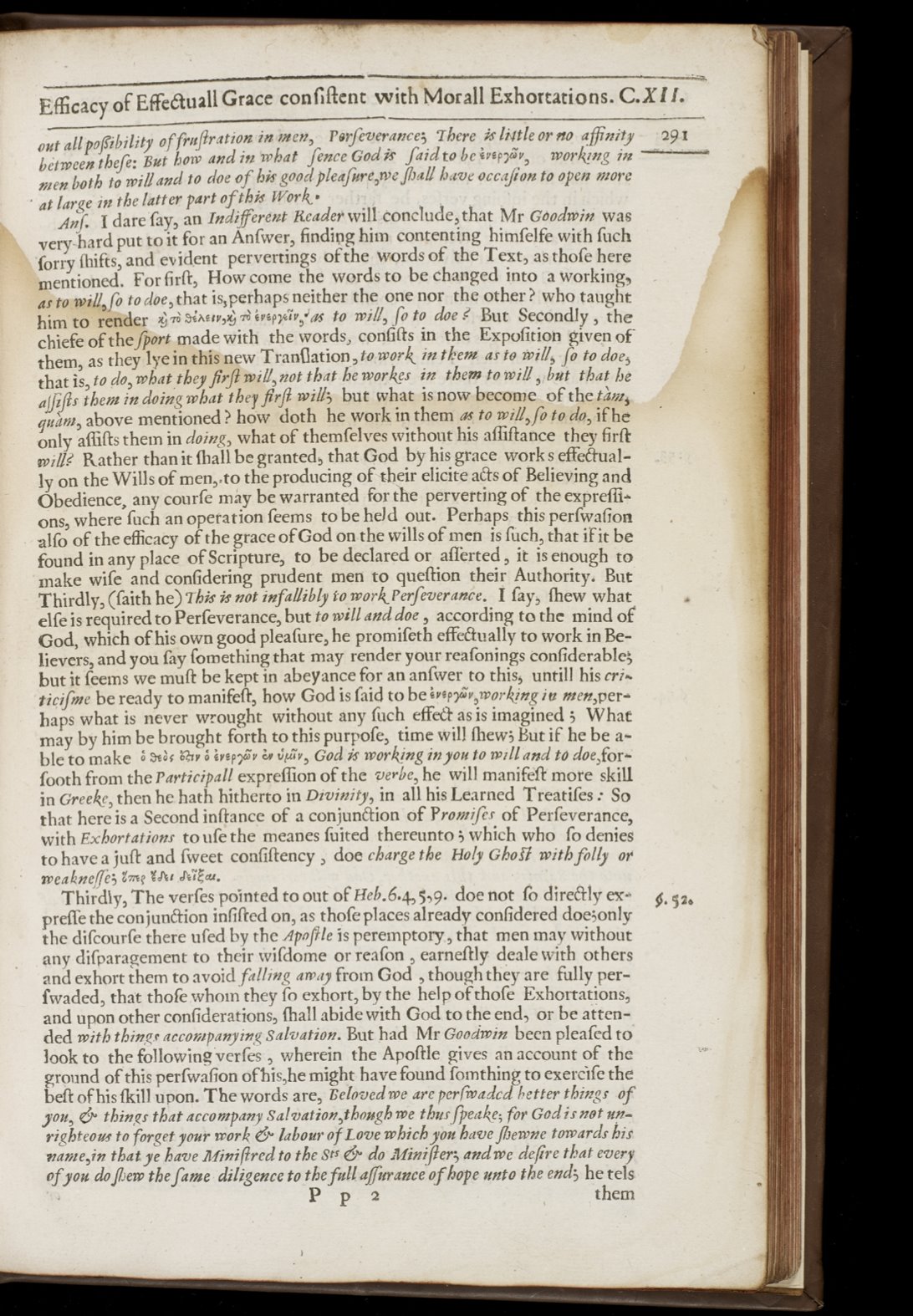

Efficacy
of
Etfe6ìuall
Grace
confiftent
with
Morali
Exhortations.
C.XII.
out
all
of
fruflration in
men, Perfeverance;
There
is
little
or
no
aßnity
29i
bètween
theft:
But
how
and in what
fence
God
it faid
to
be
irr,
ywr,
working
in
men both
to
will
and
to
doe
of
his good pleafure,ive
(ball
have
occafion to open more
at
large
in
the
latter part
of
this
Work.
Anf.
I
dare fay, an Indifferent
Reader
will
conclude,
that
Mr
Goodwin
was
very-bard
put
to
it
for
an
Anfwer,
finding him
contenting
himfelfe
with fuch
lorry
íhifts,
and evident pervertings
of
the
words
of
the
Text,
as
thofe
here
mentioned.
For
firft,
How come
the
words
to
be changed into
a
working,
as
to
will,
fo
to
doe,
that
is,perhaps neither
the
one
nor the other
?
who
taught
him
to
render
sdrerr,
i
ivsnarr,Jas
to will,
fo
to doe
?
But
Secondly
,
the
chiefe
of
the
fport made with
the words, confins
in
the
Expofition given
of
them,
as
they lye in this new
Trantlation,
to
work in them
as
to
will,
fo
to
doe,
that
is,
to do,
what
they
firfl
will, not
that
he
works
in
them
to
will
,, but
that
he
aJ
fls
them
in doing
what
they
flrfl
will;
but
what
is
now become
of
the
tam,
quart,
above mentioned
?
how
doth
he work
in
them
no
to
will,
fo
to do,
if
he
only
aff
f
s
them
in
doing,
what
of
themfelves
without
his
afiinance they
fire
will?
Rather than
it
(hall
be granted, that God
by
his
grace work
s
effe&ual-
ly
on the Wills
of
men,.to the
producing
of
their
elicite
aers
of
Believing
and
Obedience,
any
courfe may
be warranted
for
the perverting
of
the
expref-
ons, where
fuch
an
operation
feems
to
be held out. Perhaps
this perfwafion
alto
of
the
efficacy
of
the grace
of
God on the
wills
of
men
is
filch,
that
if
it
be
found
in any place
of
Scripture,
to be
declared
or
afferted
,
it
is
enough
to
make
wife
and
confidering
prudent
men
to
quenion their Authority.
But
Thirdly,
(faith
he)
This is
not infallibly toworkPerfeverance.
Ì
fay, thew
what
elfe
is
required
to
Perfeverance,
but
to
will
and
doe
, according
to
the mind
of`
God,
which
of
his
own good pleafure, he promifeth
effe&ually
to
work
inBe-
lievers,
and you
fay
fomething
that
may render your reafonings confiderable;
but
it
feems we
mull be kept
in
abeyance for
an
anfwer to this, untill
his
cri-
ticifine
be
ready
to
manifeft,
how God
is
laid
to
be
wary.
"r,workrng
in men,per-
baps
what
is
never wrought without any
fuch
effe& as is
imagined
,
What
may by himbe
brought forth to
this purpofe,
time
will fhewi But
if
be
be a-
ble
to
make
;
s£àc
21r
ó
irepyr
út
r,
God
is working
in
you to
will and
to
doe,for-
booth
from
the
Participall expreffion
of
the
verbe,
he
will manife
l more
skill
in
Greeke,
then he bath
hitherto
in
Divinity,
in all
his
Learned Treatifes :
So
that
here
is
a
Second
inttance
of
a
conjun
&ion
of
Promifes
of
Perfeverance,
with
Exhortations
to
ufe
the
meanes fuited
thereunto
4
which who
fo
denies
to
have
a
juif and
tweet continency
,
doe
charge
the
Holy
Gholi withfolly
or
weakneffe,
d5Tfn.
Thirdly, The
verfes
pointed
to
out
of
Heb.6.4, 5,9.
doe not
fo
direaly
exa
preffe
the conjun
&ion
infined on,
as
thofe
places
already
confidered
doe,only
the
difcourfe
there
ufed by the
Apofile
is
peremptory.,
that
men may
without
any difparagement
to
their wifdome
or
reafon
,
earneftly deale with
others
and exhortthem
to
avoid falling
away
from God , though they are fully per -
fwaded,
that
thofe whom they
fo
exhort, by
the
help
of
thofe Exhortations,
and
upon
other
confiderations, thall abide with
God
to
the end, or be
atten-
ded with
thing
r
accompanying
salvation.
But
had
Mr
Goodwin
been pleafed
to
look
to
the followingverfes ,
wherein
the Aponle
gives an
account
of
the
ground
of
this perfwafion
ofbis,hemight havefound
fomthing to
exercife
the
ben of
his
(kill
upon.
The
words are,
Beloved
we
are perfwaded better things
of
you,
&
things
that
accompany
Salvation,though
we
thusfpeake;
for God
is net un-
righteous
to
forget your
work
&
labour
of
Love
which
you
have fbewne towards
his
name,in
that
ye have
Mini
fired
to
the
Srs
&
do
Miniffer,
and
we
de
/ire
that
every
of
you
do
Phew
the
fame
diligence
to
the
full
affurance
o
f
hope
unto
the end,
he
tels
P
p
2
them
4.
326










